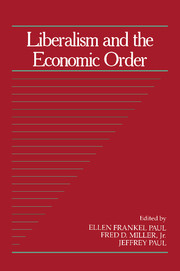Book contents
- Frontmatter
- Contents
- Introduction
- Acknowledgments
- Contributors
- The Social Market Economy
- From Post-Communism to Civil Society: The Reemergence of History and the Decline of the Western Model
- Asymmetrical Reciprocity in Market Exchange: Implications for Economies in Transition
- Institutions, Nationalism, and the Transition Process in Eastern Europe
- The Economic and Political Liberalization of Socialism: The Fundamental Problem of Property Rights
- Democracy, Markets, and the Legal Order: Notes on the Nature of Politics in a Radically Liberal Society
- Liberalism: Political and Economic
- Socialism as the Extension of Democracy
- Liberalism, Welfare Economics, and Freedom
- Some Rules of Constitutional Design
- The Morality of Inclusion
- A New Contractarian View of Tax and Regulatory Policy in the Emerging Market Economies
- Associations and Democracy
- Index
The Morality of Inclusion
Published online by Cambridge University Press: 05 October 2010
- Frontmatter
- Contents
- Introduction
- Acknowledgments
- Contributors
- The Social Market Economy
- From Post-Communism to Civil Society: The Reemergence of History and the Decline of the Western Model
- Asymmetrical Reciprocity in Market Exchange: Implications for Economies in Transition
- Institutions, Nationalism, and the Transition Process in Eastern Europe
- The Economic and Political Liberalization of Socialism: The Fundamental Problem of Property Rights
- Democracy, Markets, and the Legal Order: Notes on the Nature of Politics in a Radically Liberal Society
- Liberalism: Political and Economic
- Socialism as the Extension of Democracy
- Liberalism, Welfare Economics, and Freedom
- Some Rules of Constitutional Design
- The Morality of Inclusion
- A New Contractarian View of Tax and Regulatory Policy in the Emerging Market Economies
- Associations and Democracy
- Index
Summary
NEW STATES, NEW ECONOMIES, AND THE PURSUIT OF SELF-INTEREST
Today we are witnessing two dramatic processes: the fragmentation of old states and empires, followed by the emergence of new states and new forms of political association; and the construction of new economies out of the ruins of state socialism. These two processes–the redrawing of political boundaries and the creation of economies–are not independent of one another. In some cases, the desire for a new, more productive economy supplements other motives for state-breaking and state-making. In others, even if the fragmentation of political union results from other factors, such as ethnic divisions or the resurgence of nationalism against a weakened imperial center, the fragments may sort themselves out into new states, federations, or commonwealths, according to what they believe to be maximally productive economic units.
These momentous, largely unanticipated developments make it difficult to evade certain fundamental and perplexing questions about what may be called the morality of inclusion–questions upon which political philosophy has generally remained unhelpfully silent. The chief question is this: What general obligations, if any, do we have, either as individuals or collectively, to endeavor to include others in our states or our economies (when they would find it beneficial to be included)? (By “general” obligations I mean to exclude special obligations arising from past joint activity as well as those arising from promises, contracts, or agreements.)
A few examples will suffice to illustrate both that the scope of issues involving the morality of inclusion is quite broad and that the issues themselves are urgent and practical, not just abstract possibilities of moral theory.
- Type
- Chapter
- Information
- Liberalism and the Economic Order , pp. 233 - 257Publisher: Cambridge University PressPrint publication year: 1993



